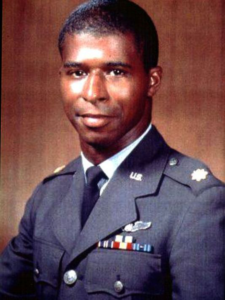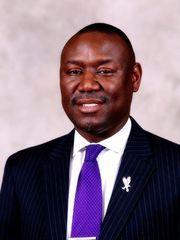This week marks the 50th anniversary of the loss of one of our most forgotten brothers: Maj. Robert H. Lawrence, Jr., America’s first black astronaut. This year, he is receiving the recognition he’s long deserved.

In the late 1960s, development of manned space systems for military use by the U.S. and the Soviet Union was well underway. In June 1967, Lawrence — just 31 years old and already an accomplished Air Force officer — was selected to be an astronaut in a program created to explore the value in military space missions.
Just six months later, before he was ever launched into orbit, Lawrence perished on Dec. 8, 1967, in a jet crash while training for this program. He was the only astronaut from his team who died in service, and the first black astronaut at that, yet his remarkable achievements and sacrifice went unsung for decades.Friday marks 50 years since that tragic accident, and Lawrence’s legacy will be celebrated by his Omega Psi Phi fraternity brothers and other distinguished guests at a Memorial Tribute hosted by the Astronauts Memorial Foundation Center for Space Education at the Kennedy Space Center Visitor Complex. A special wreath will be placed at the base of the national Space Mirror Memorial, and a documentary of Lawrence’s remarkable life, “The First, But Not the Last,” will be unveiled.
In my high school science class, we were shown the movie, “The Right Stuff,” which was a drama about the recruitment of the first seven astronauts to go into space. They were seven young white men. I remember thinking that no people of color must have had “the right stuff.” In documenting Lawrence’s story, young people of color will know that somebody who looked like them did have the right stuff as well.
Lawrence died in service to our country and the space program before he technically earned the title “astronaut.” This technicality should not be the barrier that keeps generations of young children of color from being inspired that a person who looks like them had the right stuff.

Despite the unimaginable challenges faced by African-Americans in that era, Lawrence overcame them all. He graduated with a degree in chemistry and distinguished himself as a cadet commander in the Air Force Reserve Officer Training Corps. Lawrence went on to receive a commission as a second lieutenant in the Air Force Reserve Program, and earned a doctor’s degree in physical chemistry from Ohio State University. Lawrence completed training to be designated as an Air Force pilot, and by the time he was 25 he was serving as an instructor. He later became a senior Air Force pilot.
The fact that Lawrence rose above the many obstacles he faced as a black man in the 50s and 60s makes it all the more important that we, and all Americans, recognize him for his achievements. But for too many years, he was entirely ignored by the history books, at least in part because of America’s racist tendencies.
Lawrence’s story is so important — just think of all the black and brown children who dream of careers in space and science and will see in him a role model worthy of their highest aspirations.
Legends like Lawrence should not be forgotten because of the color of their skin. Hollywood features like the recent blockbuster “Hidden Figures” share the largely untold stories of esteemed black Americans whose hard work was not prominently recognized. As with the real-life heroes behind “Hidden Figures,” it is my great hope that 50 years later, Lawrence’s story will become a larger part of the national consciousness to inspire our next generation.
Lawrence broke innumerable barriers when he was selected to America’s elite corps of astronauts, and he will forever be remembered as our legacy, our first black astronaut.
The Major Robert Lawrence Memorial Tribute is free and open to the public but an RSVP is necessary for parking and access to the Kennedy Space Center Visitor Complex. Please contact Andrea Smith at asmith@amfcse.org to RSVP and receive event information.
Ben Crump is a nationally known civil rights attorney and advocate, Omega Psi Phi fraternity member, and founder and principal of Tallahassee-based Ben Crump Law.











